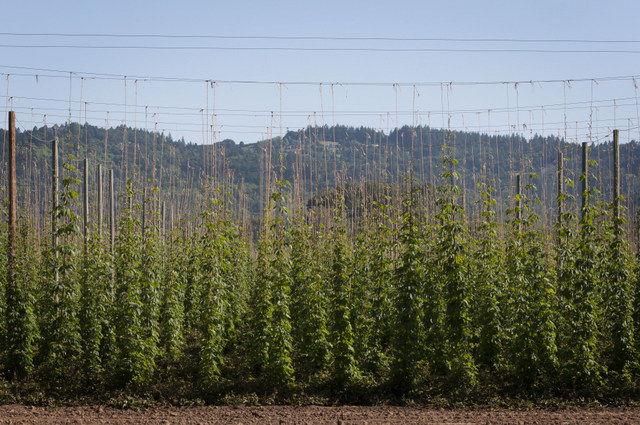
Humulus lupulus isn’t the easiest crop to commercially farm. Hops are a vigorous, climbing, herbaceous perennial trained to grow up strings in a field (see above), and just building the trellis system to farm it is capital intensive. Buying commercial-grade equipment to pick, process and pelletize those beautiful hop flower cones is equally expensive. It usually takes three years before you can even think about selling your first crop. Plus, new farms are competing against 100-year-old, generational hop farms from the Pacific Northwest to Germany, which can both price you out and beat your quality.
Yet, demand for hops from the brewing industry is at an all-time high. Couple that with craft beer brands gravitating toward local ingredients that express their regional character and personality, and hop yards are popping up in the northern states all over America. Our northern neighbor Canada is even starting to embrace this new era of localized hop farming. According to CBC/Radio-Canada:
The Ontario Ministry of Agriculture, Food and Rural Affairs estimates there are currently 339 acres of hops being farmed in Canada. Two years ago, there were only 255 acres.
But let’s put that in perspective: The Pacific Northwest planted 51,115 acres for a record season in 2016. Still, a growing number of farmers and entrepreneurs in Canada think they can still finagle a financial return on a hop yard and do something that satisfies their adventurous spirit.
Clear Valley Hops near Collingwood, Ont., is mentioned in the CBC/Radio-Canada article above. The four-year-old farm already has about 20 breweries buying its crop. Laurie Thatcher-Craig and her husband John Craig run this labor of love. But it ain’t cheap, and it ain’t easy. From the article:
[Laurie Thatcher-Craig] estimates the cost is about $50,000 per acre. To date, they have 13 acres of production and have spent about $1.3 million, and they’re hoping by next year they’ll start to get a return on their investment.
It’s a big risk, especially given there’s no crop insurance for hops yet that covers production losses caused by natural hazards.
“It’s a 24-hour-a-day job growing hops in Ontario,” Thatcher-Craig said. “My poor husband, he’s out at 4:30 a.m. every morning monitoring the irrigation system, turning valves on and off. We check all of the varieties every day to see, ‘OK, is there a break in the hose? Is there a problem over here?'”
You can’t help but admire these brave pioneers. Read the entire article over here. It’s good stuff.





Kenny Ronald Graley liked this on Facebook.
Jared Read liked this on Facebook.
Willet Hop and Grain liked this on Facebook.
Canada is growing more than 300 acres of hops (at a cost of about $50,000 an acre) https://t.co/o3wuVfwisv via @craftbrewingbiz
Amy Fischer liked this on Facebook.